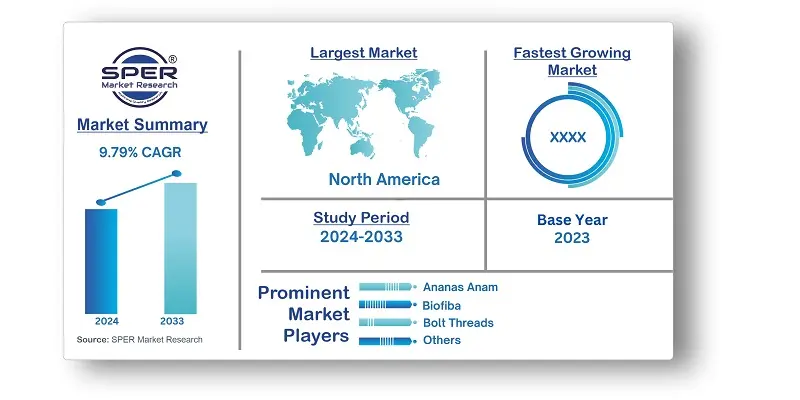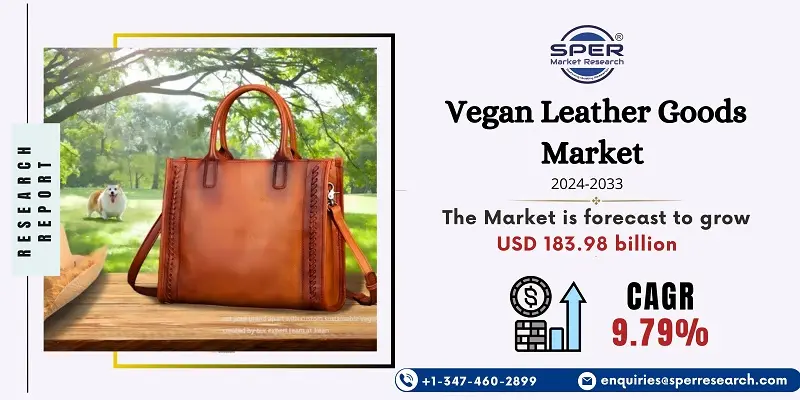
Vegan Leather Goods Market Growth, Size, Trends, Demand, Share, Revenue and Future Outlook
Vegan Leather Goods Market Size- By Source, By Application, By End User- Regional Outlook, Competitive Strategies and Segment Forecast to 2033
| Published: May-2024 | Report ID: FMCG24111 | Pages: 1 - 215 | Formats*: |
| Category : Consumer & Retail | |||
- March 2022; Polybion, a Mexican biotechnology start up, revealed that they would be launching Celium, a new vegan leather made from agro-industrial food waste. The bio-textile is made from sustainable materials and is meant to replace conventional products. Moreover, this material is available for use in fashion, sportswear, and automobile applications.
- November 2021; A biotech starts up and the German luxury handbag brand Melina Bucher announced their partnership to create vegan leather that is plastic-free and bio based. It is anticipated that this partnership will bring a range of accessories made of bio-based materials. The increasing demand from consumers for sustainable products has led to this collaboration.


| Report Metric | Details |
| Market size available for years | 2020-2033 |
| Base year considered | 2023 |
| Forecast period | 2024-2033 |
| Segments covered | By Source , By Application, By End-User |
| Regions covered | North America, Asia-Pacific, Latin America, Middle East & Africa and Europe |
| Companies Covered | Ananas Anam, Biofiba, Bolt Threads, Desserto, Kombucha Couture, Matt & Nat, MycoWorks, Vega, Votch, Will’s Vegan Shoes, Others. |
- Industry Players and Manufactures
- Retailers and Distributors
- Investors and Financial Institutions
- Government Agencies and Regulatory Bodies
- Research and Development Professionals
- Environmental Organizations and Advocacy Groups
- Consumers
| By Application: |
|
| By End-User: |
|
| By Region: |
|
- Global Vegan Leather Goods Market Size (FY’2024-FY’2033)
- Overview of Global Vegan Leather Market
- Segmentation of Global Vegan Leather Goods Market By Source (Synthetic/Plastic based, Natural/Plant based)
- Segmentation of Global Vegan Leather Goods Market By Application (Apparels, Footwear, Bags & Wallets, Vehicle upholstery, Fashion Accessories)
- Segmentation of Global Vegan Leather Goods Market By End-User (Fashion, Furniture, Automotive, Textile, Furnishing, Electronics)
- Statistical Snap of Global Vegan Leather Goods Market
- Expansion Analysis of Global Vegan Leather Goods Market
- Problems and Obstacles in Global Vegan Leather Goods Market
- Competitive Landscape in the Global Vegan Leather Goods Market
- Impact of COVID-19 and Demonetization on Global Vegan Leather Goods Market
- Details on Current Investment in Global Vegan Leather Goods Market
- Competitive Analysis of Global Vegan Leather Goods Market
- Prominent Players in the Global Vegan Leather Goods Market
- SWOT Analysis of Global Vegan Leather Goods Market
- Global Vegan Leather Goods Market Future Outlook and Projections (FY’2024-FY’2033)
- Recommendations from Analyst
1.1. Scope of the report1.2. Market segment analysis
2.1. Research data source2.1.1. Secondary Data2.1.2. Primary Data2.1.3. SPER’s internal database2.1.4. Premium insight from KOL’s2.2. Market size estimation2.2.1. Top-down and Bottom-up approach2.3. Data triangulation
4.1. Driver, Restraint, Opportunity and Challenges analysis4.1.1. Drivers4.1.2. Restraints4.1.3. Opportunities4.1.4. Challenges4.2. COVID-19 Impacts of the Global Vegan Leather Goods Market.
5.1. SWOT Analysis5.1.1. Strengths5.1.2. Weaknesses5.1.3. Opportunities5.1.4. Threats5.2. PESTEL Analysis5.2.1. Political Landscape5.2.2. Economic Landscape5.2.3. Social Landscape5.2.4. Technological Landscape5.2.5. Environmental Landscape5.2.6. Legal Landscape5.3. PORTER’s Five Forces5.3.1. Bargaining power of suppliers5.3.2. Bargaining power of buyers5.3.3. Threat of Substitute5.3.4. Threat of new entrant5.4. Heat Map Analysis5.3.5. Competitive rivalry
6.1. Global Vegan Leather Goods Market Manufacturing Base Distribution, Sales Area, Product Type6.2. Mergers & Acquisitions, Partnerships, Product Launch, and Collaboration in Global Vegan Leather Market
7.1. Global Vegan Leather Goods Market Size, Share and Forecast, By Source, 2020-20267.2. Global Vegan Leather Goods Market Size, Share and Forecast, By Source, 2027-20337.3. Synthetic/Plastic based7.4. Natural/Plant based
8.1. Global Vegan Leather Goods Market Size, Share and Forecast, By Application, 2020-20268.2. Global Vegan Leather Goods Market Size, Share and Forecast, By Application, 2027-20338.3. Apparels8.4. Footwear8.5. Bags & Wallets8.6. Vehicle upholstery8.7. Fashion Accessories
9.1. Global Vegan Leather Goods Market Size, Share and Forecast, By End-Users, 2020-20269.2. Global Vegan Leather Goods Market Size, Share and Forecast, By End-Users, 2027-20339.3. Fashion9.4. Furniture9.5. Automotive9.6. Textile9.7. Furnishing9.8. Electronics
10.1. Global Vegan Leather Goods Market Size and Market Share
11.1. Global Vegan Leather Goods Market Size and Market Share By Region (2020-2026)11.2. Global Vegan Leather Goods Market Size and Market Share By Region (2027-2033)11.3. Asia-Pacific11.3.1. Australia11.3.2. China11.3.3. India11.3.4. Japan11.3.5. South Korea11.3.6. Rest of Asia-Pacific11.4. Europe11.4.1. France11.4.2. Germany11.4.3. Italy11.4.4. Spain11.4.5. United Kingdom11.4.6. Rest of Europe11.5. Middle East and Africa11.5.1. Kingdom of Saudi Arabia11.5.2. United Arab Emirates11.5.3. Qatar11.5.4. South Africa11.5.5. Egypt11.5.6. Morocco11.5.7. Nigeria11.5.8. Rest of Middle-East and Africa11.6. North America11.6.1. Canada11.6.2. Mexico11.6.3. United States11.7. Latin America11.7.1. Argentina11.7.2. Brazil11.7.3. Rest of Latin America
12.1. Ananas Anam12.1.1. Company details12.1.2. Financial outlook12.1.3. Product summary12.1.4. Recent developments12.2. Biofiba12.2.1. Company details12.2.2. Financial outlook12.2.3. Product summary12.2.4. Recent developments12.3. Bolt Threads12.3.1. Company details12.3.2. Financial outlook12.3.3. Product summary12.3.4. Recent developments12.4. Desserto12.4.1. Company details12.4.2. Financial outlook12.4.3. Product summary12.4.4. Recent developments12.5. Kombucha Couture (Malai, Kombucha Couture)12.5.1. Company details12.5.2. Financial outlook12.5.3. Product summary12.5.4. Recent developments12.6. Matt & Nat12.6.1. Company details12.6.2. Financial outlook12.6.3. Product summary12.6.4. Recent developments12.7. MycoWorks12.7.1. Company details12.7.2. Financial outlook12.7.3. Product summary12.7.4. Recent developments12.8. Vegea12.8.1. Company details12.8.2. Financial outlook12.8.3. Product summary12.8.4. Recent developments12.9. Votch12.9.1. Company details12.9.2. Financial outlook12.9.3. Product summary12.9.4. Recent developments12.10. Will’s Vegan Shoes12.10.1. Company details12.10.2. Financial outlook12.10.3. Product summary12.10.4. Recent developments12.11. Others
SPER Market Research’s methodology uses great emphasis on primary research to ensure that the market intelligence insights are up to date, reliable and accurate. Primary interviews are done with players involved in each phase of a supply chain to analyze the market forecasting. The secondary research method is used to help you fully understand how the future markets and the spending patterns look likes.
The report is based on in-depth qualitative and quantitative analysis of the Product Market. The quantitative analysis involves the application of various projection and sampling techniques. The qualitative analysis involves primary interviews, surveys, and vendor briefings. The data gathered as a result of these processes are validated through experts opinion. Our research methodology entails an ideal mixture of primary and secondary initiatives.



Frequently Asked Questions About This Report
PLACE AN ORDER
Year End Discount
Sample Report
Pre-Purchase Inquiry
NEED CUSTOMIZATION?
Request CustomizationCALL OR EMAIL US
100% Secure Payment






Related Reports
Our Global Clients
Our data-driven insights have influenced the strategy of 200+ reputed companies across the globe.




















